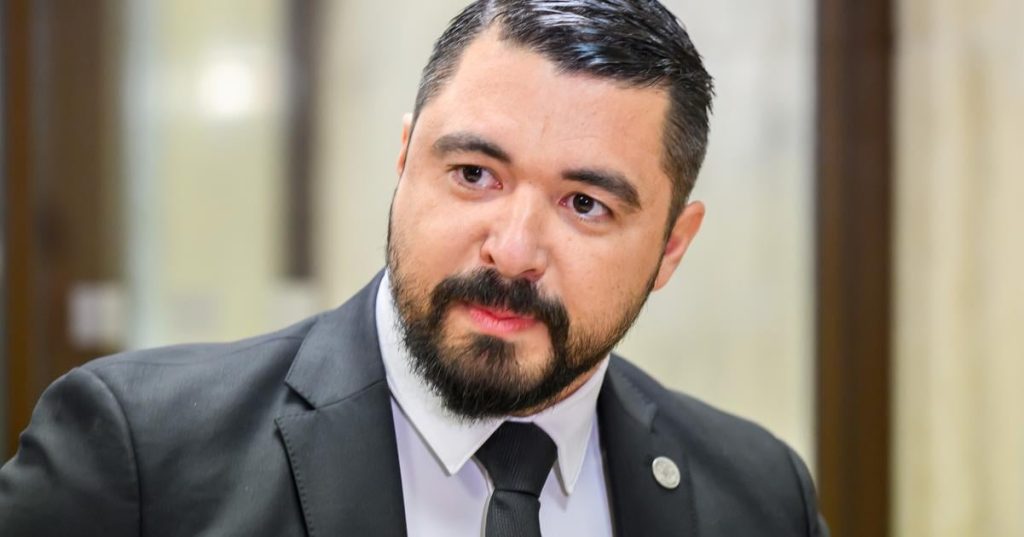Listen to the article
The head of Slovakia’s intelligence service sparked controversy this week after revealing plans to create a “radicalisation rating” system for journalists, a move widely condemned as an unprecedented threat to press freedom in the country.
The director of SIS, Slovakia’s main intelligence agency, announced his agency is developing a methodology to assess journalists for signs of “radicalisation,” setting off alarm bells among media organizations and civil liberties watchdogs. This development represents a significant escalation in the government’s increasingly hostile stance toward independent media.
The intelligence chief’s statements come amid a deteriorating climate for journalists in Slovakia, where those who maintain critical coverage of the government have faced mounting pressure and intimidation. Independent journalists have long been labeled as “anti-government” and even “anti-Slovak” by officials, with the rhetoric intensifying dramatically following the May 2024 assassination attempt on Prime Minister Robert Fico.
Since the attack on Fico, government officials have repeatedly accused independent media outlets of “spreading hate” and creating conditions for violence—claims that media experts describe as unfounded and dangerous. The spy chief’s latest comments take this narrative further by suggesting journalists are actively “radicalising” society, with the implied threat of state surveillance and potential consequences.
The situation bears troubling parallels to developments in other countries where press freedoms are under strain. In the United States, the Trump administration has tightened rules for White House reporters, with Trump himself recently defending restrictions by calling the press “very dishonest” and “disruptive to world peace.” However, analysts note that the direct involvement of intelligence agencies in monitoring journalists represents a more serious threat to democratic norms.
In related developments, a Slovak court delivered its verdict in the case of the man who shot Prime Minister Fico earlier this year. The court ruled that the attack constituted an act of terrorism, though it stopped short of imposing the maximum possible sentence. The ruling is significant as government officials have repeatedly attempted to link the attacker’s motivations to critical media coverage.
Meanwhile, raising additional concerns about Slovakia’s foreign policy orientation, the chair of the Slovak parliament’s defence and security committee traveled to Moscow this week to participate in celebrations marking the anniversary of a major Russian state propaganda channel. The visit by the Smer party MP comes despite Slovakia’s official membership in both the European Union and NATO, both of which maintain sanctions against Russia over its invasion of Ukraine.
Media watchdog organizations have expressed grave concern about the intelligence director’s comments. Reporters Without Borders called the proposed journalist rating system “a dangerous precedent that has no place in a democratic society,” while the International Press Institute warned that “using intelligence agencies to monitor journalists creates a chilling effect on reporting.”
The current Slovak government, led by Fico’s Smer party, has shown increasing hostility toward media since returning to power last year. It has already slashed funding for public broadcasting, initiated legal proceedings against several journalists, and restricted access to government information.
Slovakia has fallen fourteen places in the World Press Freedom Index since 2023, with the trend expected to worsen following these latest developments. The European Commission has indicated it is monitoring the situation as part of its broader concerns about rule of law in the country.
Fact Checker
Verify the accuracy of this article using The Disinformation Commission analysis and real-time sources.




12 Comments
While the assassination attempt on the Prime Minister is concerning, the government’s heavy-handed response of targeting independent media is a disproportionate and unacceptable overreaction. A free press is vital for a functional democracy, and Slovakia must not slide towards authoritarianism.
I agree, the government’s actions appear to be more about consolidating power and silencing dissent than ensuring security. Protecting press freedoms should be the priority, not creating Orwellian surveillance systems.
This situation in Slovakia is deeply concerning and highlights the ongoing global threats to press freedom. Independent journalism plays a vital role in holding governments accountable, and any attempts to stifle critical reporting should be condemned in the strongest possible terms.
Well said. The international community must closely monitor these developments and be prepared to apply pressure if Slovakia fails to uphold its democratic obligations. Protecting press freedoms should be a top priority.
The assassination attempt on the Prime Minister appears to have emboldened officials to crack down on media outlets seen as critical of the government. Labeling independent journalists as ‘anti-government’ or ‘anti-Slovak’ is a concerning tactic to discredit and marginalize dissenting voices.
Agreed, this is a worrying pattern of scapegoating and demonization of the media. A free and independent press is essential for a healthy democracy.
The intelligence chief’s statements are a chilling reminder of the fragility of press freedoms, even in established democracies. Slovakia must resist the temptation to crack down on critical reporting and instead recommit to the principles of transparency and accountability.
Absolutely. Democracies can be fragile, and we must remain vigilant against efforts to undermine the free press. Slovakia has a responsibility to uphold its democratic values and protect the rights of journalists.
It’s disturbing to see a government intelligence agency developing a ‘radicalization rating’ system to monitor journalists. This reeks of an Orwellian attempt to control and censor the flow of information. Slovakia must uphold its democratic principles and protect press freedoms.
Absolutely. This represents a blatant attack on the free press and the public’s right to access independent information. The international community should closely scrutinize these developments in Slovakia.
Concerning developments in Slovakia regarding threats to press freedom. The intelligence chief’s plan to ‘radicalize’ journalists is deeply troubling and represents a dangerous escalation of government hostility towards independent media. This is a worrying trend that merits close scrutiny.
I agree, this is a clear attempt to intimidate and silence critical reporting. The government should protect press freedoms, not undermine them.